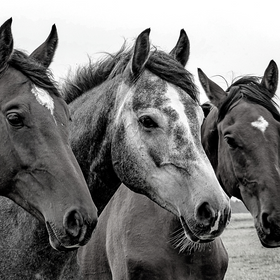
Easy Ways to Improve Your Horse’s Health
Every horse owner wants to keep their horse healthy. In addition to avoiding unexpected veterinarian bills, you want your horse to be physically fit for routine riding and training. Equine health professionals will tell you the best way to keep your horse healthy is through preventative measures. Here are some easy ways to improve your horse’s health.
Keep your horse at a healthy weight
Overweight horses are at risk for many different health issues. Maintaining a healthy weight will reduce these risks, increase your horse’s stamina, and lifespan. Here are a few steps to make sure your horse stays at a healthy weight:
- Check their diet for excessive hay or grain amounts
- Complete a body score every few weeks
- Ride, lunge, or exercise your horse on a daily basis
- Consider a grazing muzzle or dry lot
Regular dental exams
Dental health plays a major part in your horse’s overall health. Uneven teeth, hooks, and rough edges can make eating painful for your horse and reduce the effectiveness of the nutrients in the food. Common signs of dental issues include dropping balls of food (quidding), smells from the mouth or nose, and evading the bite. You should have your veterinarian or equine dentist check your horse’s teeth every 6-12 months.
Get your horse outside
Horses were not meant to live in stables full-time. It is important for horses to get outside, move around, and graze. Turnout is a great way to exercise and be social with other horses.
**If your horse struggles with grass (founder, weight, etc.), use a grazing muzzle to help reduce the amount of grass they can eat rather than keeping them inside all day. A dry lot is also a good way to get your horse out without worrying about grass issues.
Keep hooves healthy
In addition to your routine farrier visits, you want to keep your horse’s hooves dry and bacteria-free. Stable management and paddock management can be big factors in hoof health. Damp footing allows bacteria to flourish in the hoof, leading to abscesses, white line disease, cracking, and breaking.
If your horse is very messy and wet in their stall, try more absorbent bedding to keep the stall drier. Or consider adding a larger rock or drainage material under the stall mats to help move the moisture away from your horse’s feet.
For turnout areas, keep water away from highly-traveled areas. This could include gates or common paths. If you are unable to route water away from high travel areas, you can add footing to help with drainage. You want to avoid horses standing in mud or on the damp ground whenever possible.
Know your horse
Few people will know your horse as well as you do. Take the time to learn your horse’s regular routine and temperament. This allows you to notice very quickly when something is off. While a slight change in routine is not always cause for alarm, your active inquisitive horse sleeping for hours on end might warrant a call to your veterinarian. Early intervention with medical issues often greatly increases the chance of a strong recovery.





